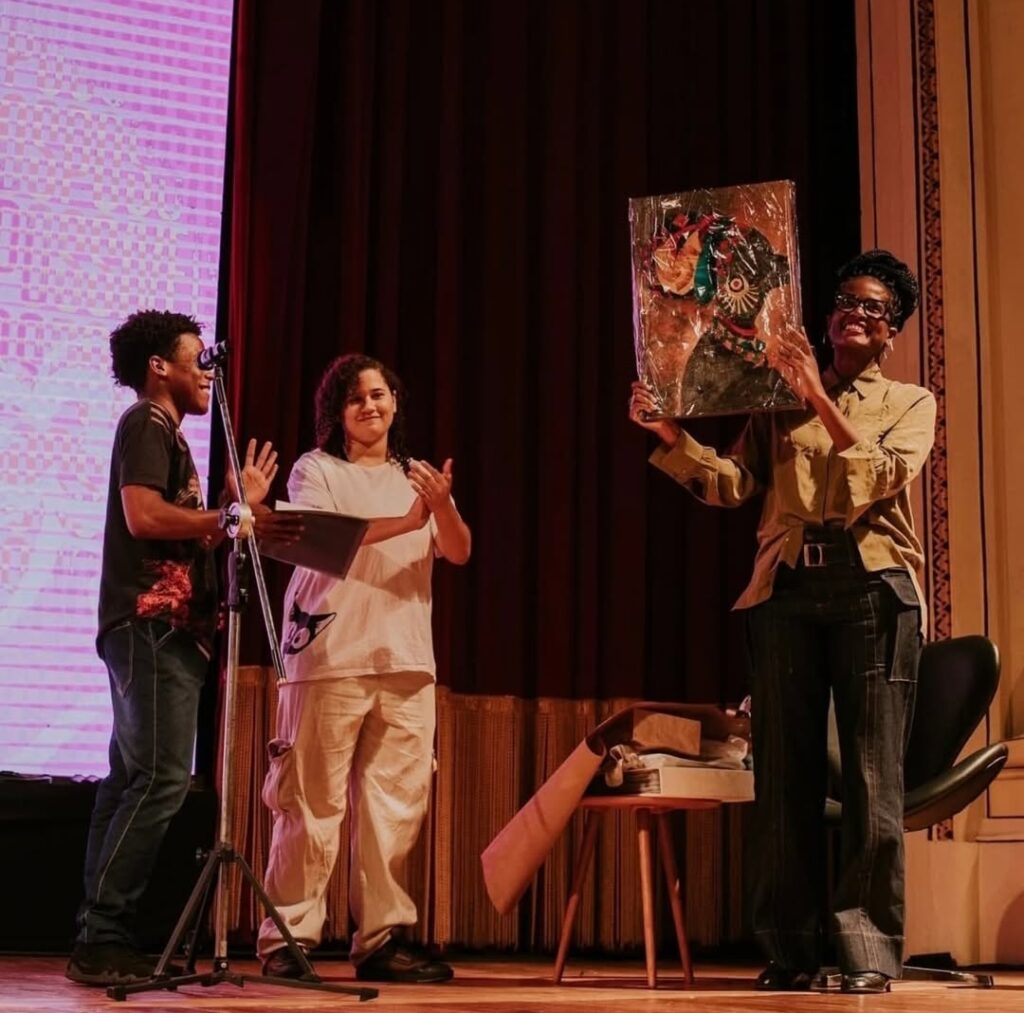Project Combinando Palavras connects Djamila Ribeiro’s work with public school students in São Paulo state

The Combinando Palavras (“Combining Words”) project marked the presence of Professor Djamila Ribeiro at the 24th edition of the Ribeirão Preto International Book Fair (FIL), held in the state of São Paulo from August 16 to 24. On August 18, hundreds of public school students from five municipalities in the region gathered at Theatro Dom Pedro II to present original songs, dances, documentaries, and performances inspired by the Brazilian philosopher’s books. “I received so many gifts! It was one of the most emotional days for me. Seeing my work resonate so deeply in the minds and hearts of young students is incredibly empowering,” Ribeiro wrote on Instagram.
In total, 12 state schools, linked to the Regional Board of Education of Ribeirão Preto, took part in the project. The participating schools were from Ribeirão Preto, Bonfim Paulista, São Simão, Santa Rosa de Viterbo, and Cravinhos. “I have been present in public schools for years, but taking part in Combinando Palavras gave everything an even deeper meaning,” she emphasized.
Honored author and honorary citizen of Ribeirão Preto
In addition to the student encounter, Professor Djamila Ribeiro was the honored author in the Education category of FIL and was granted the title of honorary citizen of Ribeirão Preto. The recognition was approved by the City Council through a bill proposed by councilwoman Duda Hidalgo (Workers’ Party – PT). The award was presented during the opening conference at Theatro Dom Pedro II on August 16. On that occasion, Ribeiro highlighted the importance of education as a right: “If I am here today, it is because I had the opportunity to study. I do not come from an academic family and had to learn everything within the feminist movement and through public policies that expanded access. Education is a collective right that can transform society.”
This was her third participation in FIL, one of the largest literary fairs in Brazil. On all occasions, the theater was filled to capacity. “Seeing this six-year cycle gaining legitimacy and strength shows the impact, permanence, and reach of our work,” she observed.
Homage and ancestry
The Abayomi Collective also moved Ribeiro with the presentation of an itan — a sacred narrative from Yoruba oral tradition — about Iyami (ancestral female power) and Oxóssi (a deity of the forests and hunting in Afro-Brazilian religions such as Candomblé).
During the honorary citizenship ceremony, councilwoman Duda Hidalgo stressed Ribeiro’s role as a popular educator: “You chose not to keep knowledge confined to academia. You decided to spread this knowledge and transform your words into struggle, immortalizing them in books.”
Anti-racist education and collective transformation
The experience in Ribeirão Preto echoed the central proposal of the Feminismos Plurais (Plural Feminisms) collection, coordinated by Ribeiro, which already includes 27 titles written by Black authors. In Pequeno Manual Antirracista (A Short Anti-Racist Handbook), she reminds readers of the urgency of expanding references in education, noting that “the model of science that is valued and considered universal is white.” The Combinando Palavras project brought this transformation to life by incorporating lugar de fala (“place of speech”) into classroom practices in a creative and plural way.
“Now, as a citizen of Ribeirão Preto, I thank you for the exchanges and for the unique welcome. Together we continue working for transformation,” Ribeiro concluded.
Content translated with the assistance of AI.
Related articles
August 18, 2025
Professor Djamila Ribeiro receives honorary citizenship of Ribeirão Preto
December 21, 2022
Djamila Ribeiro launches new website
December 21, 2022
Djamila Ribeiro is on the cover of Forbes Life